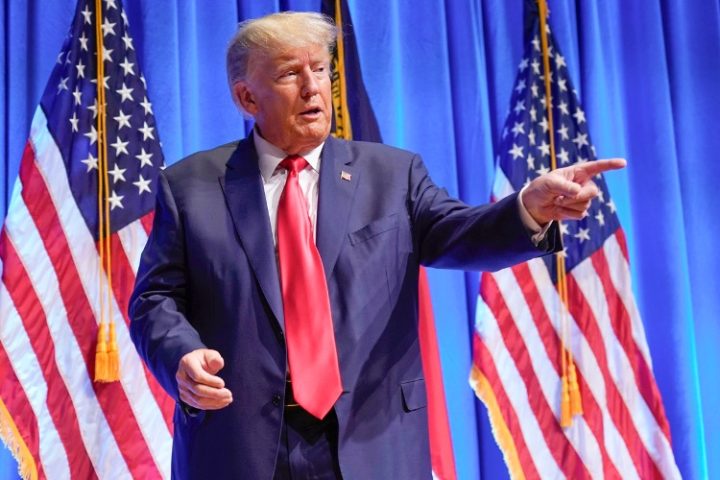
Amid a maelstrom of indictments, Donald Trump scored one win this week.
On Monday, Judge Michael Erdos of the Philadelphia County Court of Common Pleas ruled that presidential immunity shields Trump from being sued by an election worker over claims of voter fraud the 45th president made while in office in the days following the 2020 election.
Trump’s comments were from the White House during a Pennsylvania state Senate committee hearing in November of 2020. The plaintiff, James Savage — who worked as a voting machine supervisor in 2020 — alleged that Trump, attorney Rudy Giuliani, and two poll watchers conspired to defame him, which resulted in Savage receiving death threats and suffering two heart attacks.
As The Hill reports, Erdos decided that because Trump made the comments while serving as president, presidential immunity protected his speech.
“Other legal proceedings may examine the propriety of his statements and actions while he was the President and whether, as the plaintiffs in this and other cases contend, it was this conduct which served as the actual threat to our democracy,” said Erdos. “But this case is not the proper place to do so. Here, Trump is entitled to Presidential immunity.”
The judge added:
Here, then-President Trump’s Gettysburg remarks and his tweet were public. Moreover, the topic of these statements — claims from third parties and the President himself about irregularities in the Presidential election which on their face called into question the integrity of the election and whether now-President Joseph Biden had been duly elected — was undoubtedly a matter of great public concern.
Alina Habba, a legal spokeswoman for Trump, lauded the ruling.
“Today, the Court made it clear that it is well within the President’s discretion to address the integrity of our election without fear of liability,” Habba said. “We expect that the rest of Mr. Savage’s claims will similarly be disposed of as they are without merit.”
On Tuesday, Trump was indicted on felony charges for allegedly conspiring to overturn the 2020 election via the January 6, 2021 Capitol riot — which Democrats and the mainstream media have repeatedly characterized as an act of insurrection, with a narrative that Trump deliberately orchestrated the breach of the Capitol by protesters as a way of preventing the certification of the election for Joe Biden.
The indictment consists of four counts: conspiracy to defraud the United States; conspiracy to obstruct an official proceeding; obstruction of and attempt to obstruct an official proceeding; and conspiracy against rights.
Prosecutors point to the claims of voter fraud made after the election, as well as his encouragement of the adoption of pro-Trump electors in battleground states that ostensibly went to Biden.
The prosecutors assert that Trump knew his claims of fraud were false, yet “repeated and widely disseminated them anyway — to make his knowingly false claims appear legitimate, to create an intense national atmosphere of mistrust and anger, and to erode public faith in the administration of the election.”
On Truth Social, Trump blasted the indictment and the Justice Department special counsel, Jack Smith, whose investigation formed its basis.
“I hear that deranged Jack Smith, in order to interfere with the presidential election of 2024, will be putting out yet another Fake Indictment of your favorite President, me, at 5:00 P.M. Why didn’t they do this 2.5 years ago? Why did they wait so long? Because they wanted to put it right in the middle of my campaign. Prosecutorial Misconduct!”
As the Associated Press notes of Smith’s probe:
Smith’s team has cast a broad net as part of his federal investigation, with his team questioning senior Trump administration officials, including Pence, before a grand jury in Washington. Prosecutors also interviewed election officials in Georgia, Wisconsin, Michigan and other battleground states won by Biden who were pressured by the Trump team to change voting results.
Rudy Giuliani, a Trump lawyer who pursued post-election legal challenges, spoke voluntarily to prosecutors. Giuliani was not named in the indictment, but appears to match the description of one of the co-conspirators. A spokesman for Giuliani said Tuesday night that Trump had a “good-faith basis” for the actions he took.
With the latest indictment, Trump now faces three separate legal ordeals.
State prosecutors in New York have charged the 45th president with the falsifying of business records over alleged “hush money” paid to pornographic actress Stormy Daniels prior to the 2016 election. And the Justice Department has also brought a series of felony charges against Trump due to his possession of classified documents at his Mar-a-Lago home in Palm Beach, Florida.
The New York case trial is set to start in March, while the federal classified documents case will begin in May.
Trump’s situation is an unprecedented one in American history. While his detractors claim prosecuting him is essential for preserving “democracy” and the integrity of elections, Trump’s supporters argue that the various cases constitute the weaponization of the justice system for the purpose of destroying Trump’s candidacy and thereby eliminating Joe Biden’s top electoral rival.




